Click here to read more Picture This Post Hershey Felder Presents stories.
The elegance and beauty of 19th-century Russian aristocracy and the subsequent violent destruction of that lifestyle in the Bolshevik revolution are set against music that is, as the situations require, either romantic and pastoral or distressingly dissonant and urgent in Hershey Felder's new musical biography of the composer Sergei Rachmaninoff. In a departure from Felder's previous musical bios which were performed on stage in pre-pandemic times and live-streamed during the quarantine, Nicholas, Anna, and Sergei was filmed on location - in a villa in Florence, Italy that stands in for the elegant homes and palaces of the Russian aristocracy. The lush cinematography by Stefano DeCarli evokes 19th-century European grace, shooting the interior scenes and the darker elements of the story in brooding brown tones while giving a bright yellow/reddish glow to the happier outdoor scenes. The cinematic visual editing is heavy on close-ups, allowing the audience to observe the emotions of this great Russian composer as he reflects on his life in the times in which he lived.
Felder's story of Rachmaninoff uses a framing device in which we first see the composer on his deathbed in Beverly Hills, California in 1943, unconscious, suffering from melanoma, and being treated for pain with morphine. The morphine induces a hallucination in which the composer pictures himself in a conversation with Nicholas Romanoff, the last Tsar of Russia (played by J. Anthony Crane), who listens mostly passively to the musician’s story. Why does Rachmaninoff picture a conversation with the Tsar? Rachmaninoff explains that the Tsar symbolizes everything he loved about his homeland of Russia and lost when the Bolsheviks deposed the royalty and appropriated the lands of the aristocracy.
HERSHEY FELDER PRESENTS a Dramatic Telling of Rachmaninoff’s Life Story
Felder as Rachmaninoff tells his life story to Tsar Nicholas II, rather than to the audience, or to some unseen listener, as he has in his stage performances. Sergei begins speaking of his childhood when he was sent to study at the Moscow Conservatory under the demanding teacher, Nikolai Zverev. Felder as Rachmaninoff recounts how he ultimately rebelled against his martinet instructor, and left the conservatory but went on to achieve a number of early successes before the disastrous premiere of his first symphony. That brought on a depression that would last for three years. With therapy that included hypnosis, he emerged from depression and went on to compose his immensely popular Piano Concerto #2. That launched a career that kept him busy composing and conducting as well as playing piano in concerts. Rachmaninoff’s success eventually led to an invitation to visit the Tsar at one of his palaces, in the event he considered the capstone of his experience as a Russian.
From there, Felder/Rachmaninoff jumps the story to 1917 and the beginnings of the Russian Revolution. We see, through staged dramatic flashbacks, the final days of the Tsar’s rule and the assassination of, it is believed, the entire royal family. This is underscored with Felder’s performance of a long excerpt from Rachmaninoff’s Piano Concerto #2 - aloud, often dissonant, and hard-driving selection, which evokes the composer's intense anger and sense of loss of his homeland and way of life. It's an emotional and powerful pinnacle of this play, in this reviewer’s opinion though only the midpoint of Nicholas, Anna, and Sergei.
The Bolshevik Revolution soon leads to Rachmaninoff's emigration from Russia to America. Exiled from the homeland he loves, Rachmaninoff finds himself unable to compose, and his creative output in the coming years is greatly diminished. He briefly finds hope, learning of a young woman in Germany who claims to be Anastasia, the youngest daughter of the Tsar, who may have escaped the assassination of her family, thus leaving her as the only surviving member of the Romanoffs. Rachmaninoff makes plans to bring her to America in hopes that she will help him reconnect spiritually to Mother Russia, but as we know from history, this Anna was proven not to be a descendent of the Romanoffs. Rachmaninoff spent the rest of his life pining for his beloved Russia, an emotion we see through Felder’s body language – a certain weakness in his posture and closeups that reveal a joyless, almost inert face.
NICHOLAS, ANNA, AND SERGEI is a Feast for Piano Lovers
You will likely agree that Rachmaninoff’s canon is an exceptional showcase for Felder, who is an accomplished concert pianist. The Russian composer's works for piano are among the most complex and demanding pieces for pianists, and unlike the Felder stage productions, on film, we get to see closeups of Felder’s fingers on the Steinway keyboard. In addition to Rachmaninoff’s intricate pieces for piano, we hear snippets of romantic melodies that are accessible enough to have been adapted into American pop songs, as Felder’s narration explains. Music lovers of a certain age will recognize a theme from Rachmaninoff’s Piano Concerto No. 2 as Eric Carmen’s All by Myself or a melodic line from his Symphony No. 2 as Carmen’s Never Gonna Fall in Love Again. The former song is currently heard in TV commercials for Expedia.
There is ample music in this two-hour presentation to satisfy lovers of romantic classical music, in this writer’s view. In addition to the many Rachmaninoff selections performed so movingly by Felder, in a scene late in the piece, we are treated to a performance of Lenski’s Aria from Tchaikovsky's opera Eugene Onegin, sung by tenor Charles Castronovo and accompanied by a full orchestra.
A Growing Hershey Felder Canon of Musician Biographies
It’s now some 22 years since Felder began writing and performing his ever-expanding canon of composer profiles, which with Nicholas, Anna, and Sergei now numbers nine pieces.
As this writer has found of Felder’s previous composer biographies, Felder again gives us a window into the psyches and the pain of his biographical subjects. In this writer's opinion, however, the significance of Tsar Nicholas II and the presumed Duchess Anastasia are not substantial enough to have merited their inclusion in the title or as much stage time as they are given. Nonetheless, the staging in this opulent villa and the musical performances will be a delight for any classical music lover or for someone who wants to learn more about classical music and its composers.
HIGHLY RECOMMENDED
Nominate this for The Picture This Post BEST OF 2021???
Click Readers' ChoiceWant to see who won the Picture This Post READERS’ CHOICE competition last year?
WATCH THIS SHORT VIDEO—
Editor’s Note/ Full Disclosure: The author of this review, John Olson, is a well-known publicist for many Chicago theaters and sometimes a contributor to theatre publications. In that capacity, he has reviewed and interviewed Hershey Felder frequently and has become well acquainted with him professionally and socially.
CAST:
Hershey Felder as Sergei Rachmaninoff
J. Anthony Crane (Tsar Nicholas II)
Ekaterina Siurina (Natalia)
Charles Castronovo (opera singer at party)
Helen Farrell (Anna Anderson)
Igor Polesitsky (Dr. Golitzin)
Erika Bendersky
Jeffrey Thickman
Jonathan Brett
CREATIVE TEAM:
Writer: Hershey Felder
Directors: Felder and Stefano DeCarli
Music: Sergei Rachmaninoff
Production Design: Hershey Felder
Film production and live editing: DeCarli Live
Live Broadcast and Sound Design: Erik Carstensen
Historical and Biographical Research: Meghan Maiya
Costumes and Hair: Camilla Saccardi
WHEN:
Now, Open Run
WHERE:
Streaming on demand from Hershey Felder Presents: Live from Florence website
Images courtesy of Hershey Felder Presents, Marco Badiani, and The Florentine.
TICKETS:
$55
For tickets and more information visit the Hershey Felder Presents: Live from Florence website.

About the Author: John Olson
John Olson is an arts carnivore who is particularly a love of music, theatre and film. He studied piano, trombone and string bass into his college years, performing in bands and orchestras in high school and college, at the University of Wisconsin-Madison. While working as an advertising agency account manager, he began a second career as an arts journalist and is now principal of John Olson Communications, a marketing and public relations business serving arts and entertainment clients.

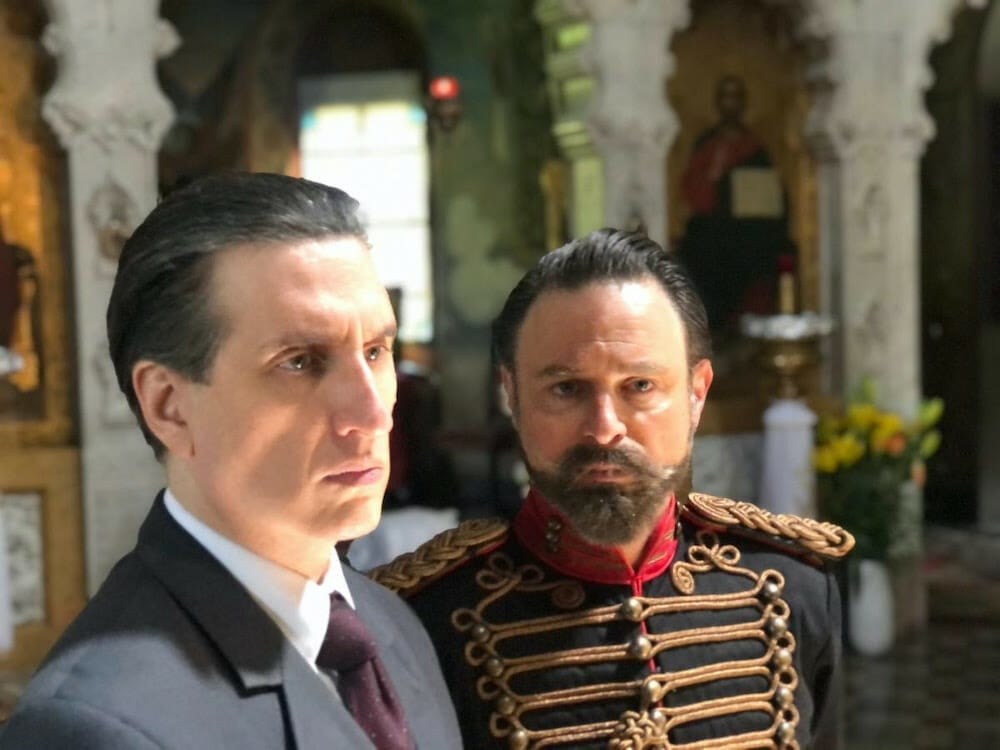
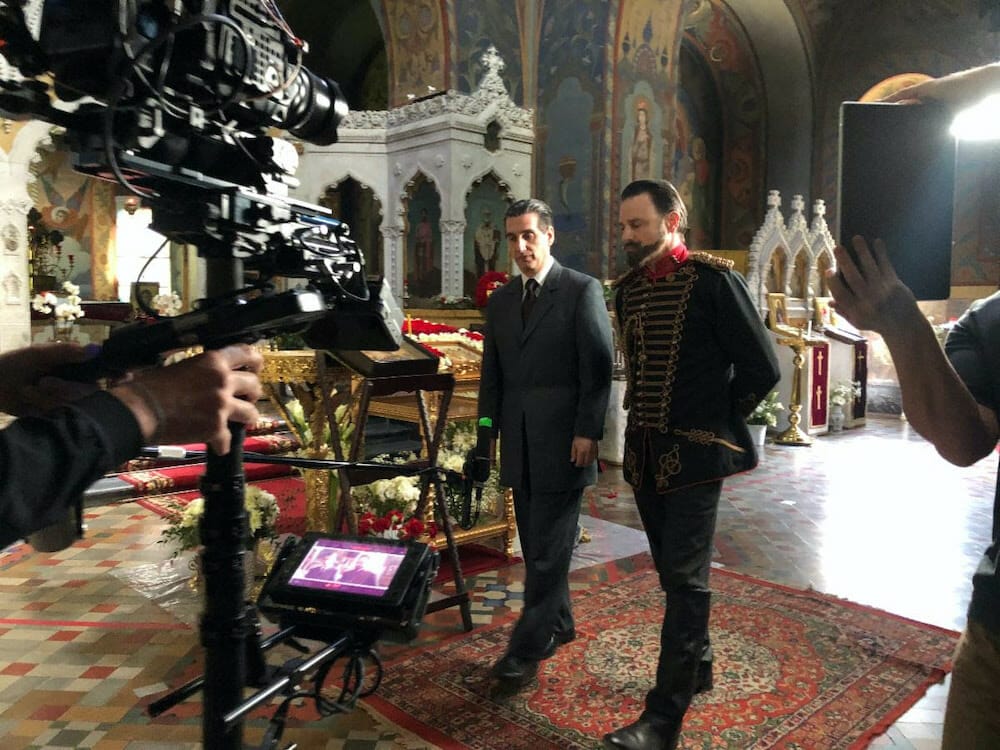
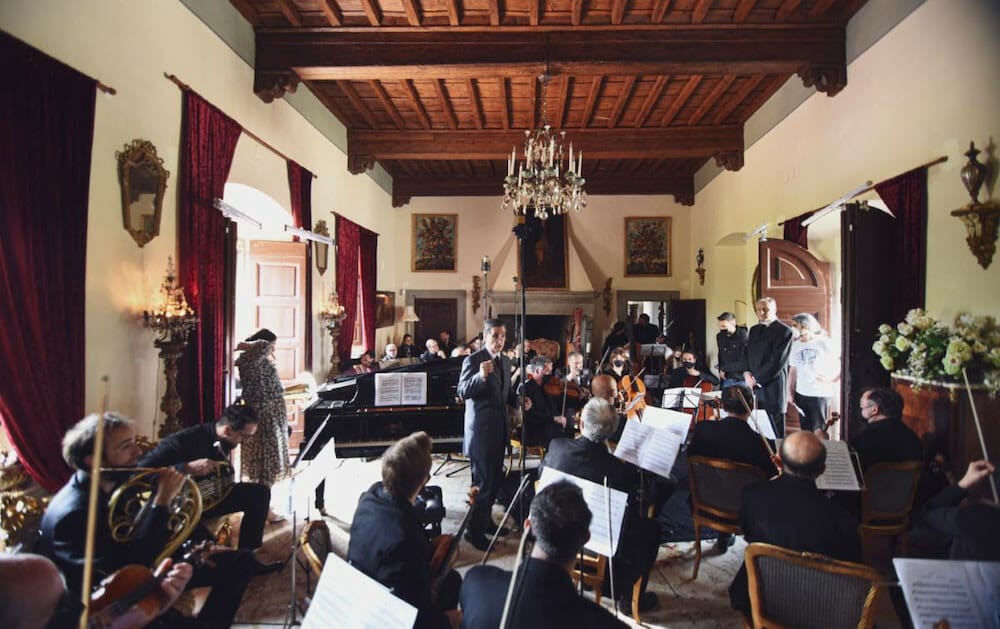
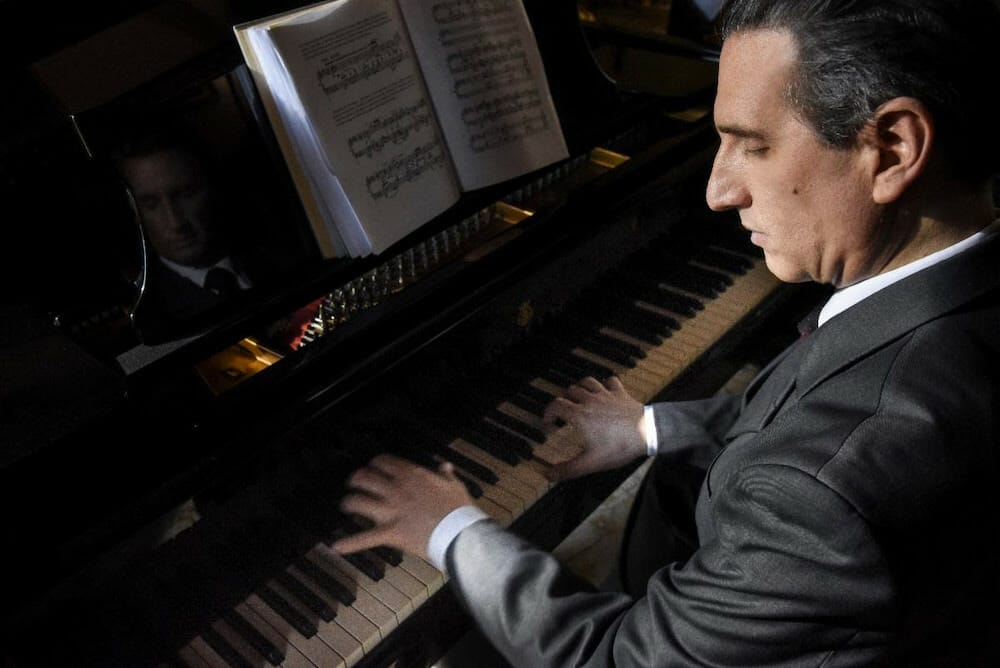
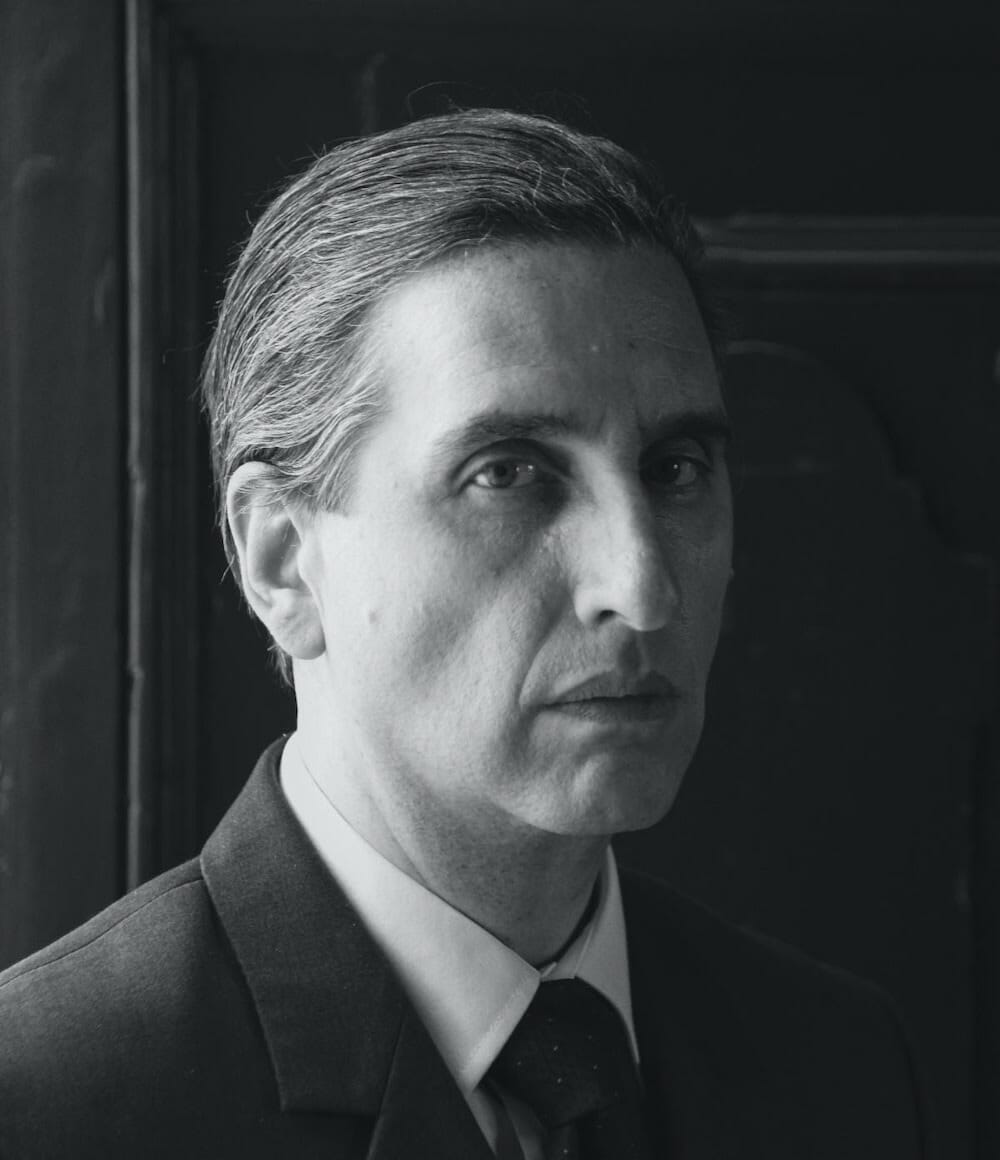
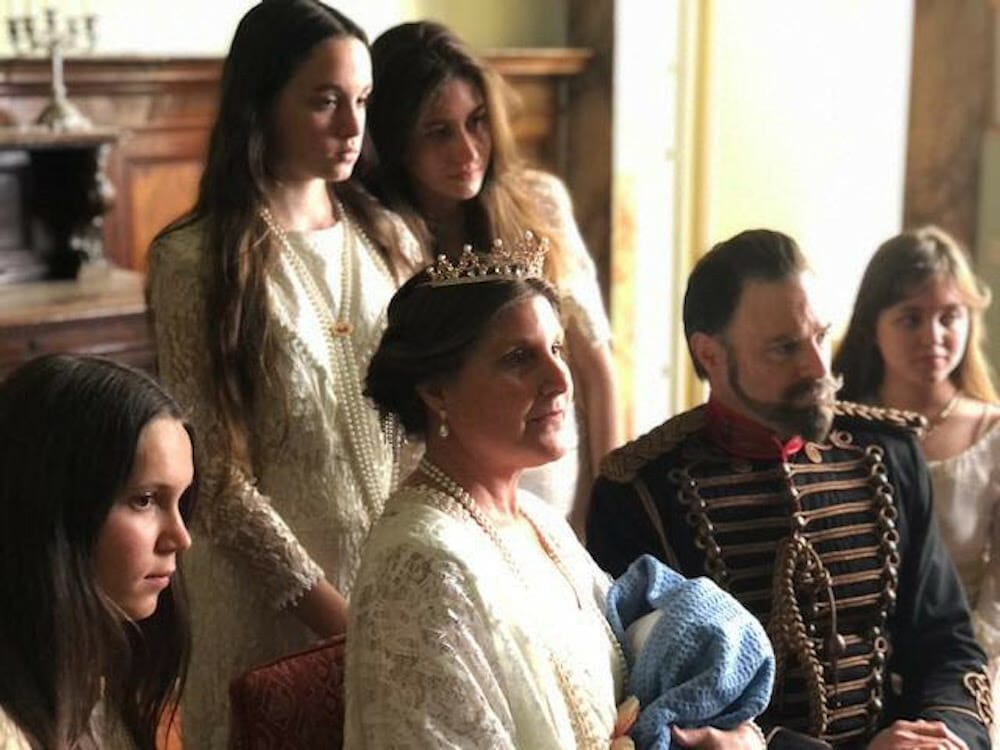


Frame is Hershey’s dual musical/biography about a Russian composer- classical music lovers get both a historical background and a concert
3 stars for showing not telling. I suppose the nature of this production requires the reviewer to focus on the movement of the characters which doubles as the plot, however, I would say some of the storyline description could be left out. It is intricate in picturesque detail but it is a bit ‘one thing leads to the next’ type of flow.
I retweeted this article.